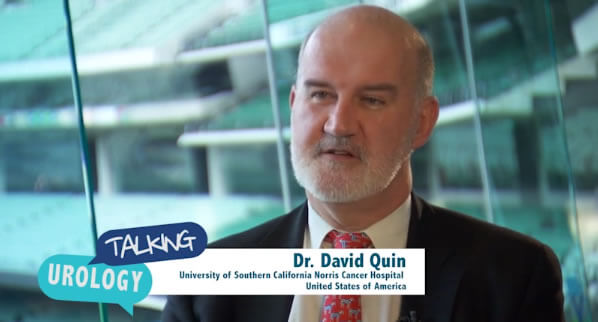ANZUP 2017 – Prof Lisa Horvath
Prof Lisa Horvath discusses her research on how a man’s plasma lipid signature can predict prognosis in castration resistant prostate cancer.Talking Urology podcast transcript
ANZUP 2017 Interviews – Joseph Ischia and Lisa Horvath
Joseph Ischia: I’m Joseph Ischia and I’m talking with Lisa Horvath who’s from the Chris O’Brien Lifehouse and she was one of the best of the best orals, one of the best research proposals put forward to ANZUP this year. We’ve got her along to talk about her study which was a distinct plasma lipid signature associated with poor prognosis in castration-resistant prostate cancer. Welcome Lisa. Can you tell us a little bit about your study?
Professor Lisa Horvath: Thank you very much. This is really a study that looks at the host. Lots of studies look at the cancer but the cancer lives in a body, and that body interacts with the cancer, interacts with the treatment and is terribly important. What we were really looking at is, what is the man’s body lipid profile metabolic factors? How do they affect the patient’s outcome from their advanced prostate cancer?
Joseph: Okay. What did you find? How were you able to separate men into good and bad prognostic?
Lisa: We looked at a group of men with castrate resistant prostate cancer with metastatic disease, primarily bony disease, and we took a blood test from them before they started Docetaxel chemotherapy. What we then did is we looked at over 300 lipid species and we looked at how the levels of those lipids might predict for a person’s subsequent outcome. What we found is that a group of lipids, in particular called the sphingolipids which affect inflammation and affect cancer cell proliferation and cancer cell death, they were upregulated. If they were high in those patient’s plasma, then the patients lived for a much shorter time period. We’re talking about the difference between a median survival of 11 months if this sphingolipid levels were high versus 22 months if the sphingolipids were normal.
Joseph: This was independent of any other factor in these men wasn’t it?
Lisa: Yes, this is independent of other known prognostic factors such as their bone turnover markers or their hemoglobin levels. Very importantly because a lot of patients in this age group have diabetes or are on lipid-lowering agents was actually independent of whether the patients already had a metabolic problem like diabetes or were they on metformin or were they on a statin. It was independent of all of those factors. In fact, when we looked at it, this signature looks a bit like metabolic syndrome, but the patients don’t have clinical features of metabolic syndrome. What we’re really seeing is there’s some metabolic abnormality going on with these patients whether it was there in the beginning when they had prostate cancer or whether it’s evolved over time because they’ve had 5 or 10 years of engine deprivation therapy. We don’t yet know that, but it looks druggable and that’s what’s very exciting.
Joseph: Okay. Because there was one thing you said, you said it’s great to find these things but can you actually target it? Do you think they can be drugged? What sort of drugs were you looking at?
Lisa: Absolutely. We’re actually looking at targeting them with statin, which is, I mean, statins have been around for 30 or 40 years. They’re easy to give. We know a lot about them. Millions of people around the world have had them. Looking at the profile, this looks like if we treat patients with a statin we can reverse the poor prognostic lipid signature. The next step is to actually say, “What happens if we treat men in this situation?” We’re doing a really really simple study which is, we take a blood test, we look at their lipidomic profile, we give them three months of statins and we take another blood test and see if we changed it.
Joseph: Yes. And that’s your current study that you’re doing at the moment then?
Lisa: Yes. We’re opening that study in a month’s time. It’s really simple. Can we reverse the signature? What’s really going to take a lot of money and be a lot longer is if we can reverse the signature, does that change what happens to the men? We’re starting with a small study, but the series of studies that could ping off from that are really important.
Joseph: So, you want to determine is it a dissociation or a causation.
Lisa: Precisely.
Joseph: Okay.
Lisa: Because lots of people have done statin studies and they’ve been very in advanced disease and they’ve gotten very mixed results, and our contention would be that they haven’t known which patients to treat. It’s just like any other form of precision medicine, any effect will get lost or diluted if you’re not picking the right patients to treat.
Joseph: Another thing is, it really gives a lot of kudos to the exercise movement. Can you imagine, exercise must change this environment and the thought of the exercise results where you think we’re too good to be, how can exercise reduce your risk of dying from prostate cancer, but you may have nailed the region that it’s occurring in
Lisa: Absolutely. And again, it was mentioned by a speaker in one of the sessions, you also want to be able to pick which patients should be doing more intensive exercise. We’re looking at druggable targets but just as easily, this may be that this signature should be used to predict patients in whom an intensive exercise program would be beneficial. We don’t know. It’s one of those studies that’s creating more questions than it’s answering. But there are a whole pile of different and interesting questions that are complementary to the genomic studies looking at the cancer.
Joseph: Excellent. Let’s just hope that NHMRC fund them all then
Lisa: Oh, you and me both.
Joseph: Thank you very much.
Lisa: Thank you.












